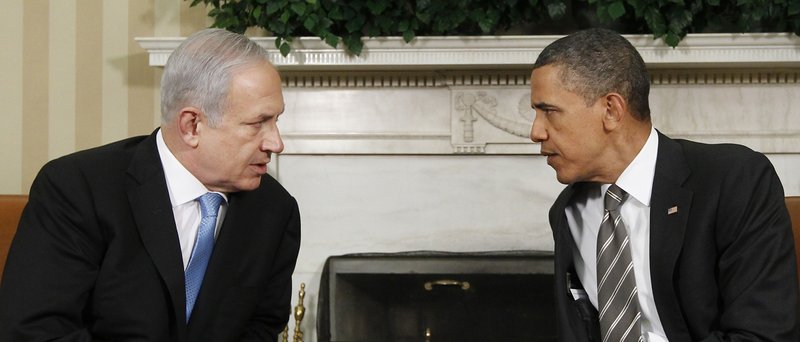WASHINGTON – Israeli Prime Minister Benjamin Netanyahu suggested Friday that President Obama holds an unrealistic view of how to achieve peace in the Middle East, saying that Israel would never pull back to the boundaries that the American president said a day earlier must be the basis for negotiations.
The unusual Oval Office exchange, following a nearly two-hour meeting, laid bare the fundamental differences between Obama and the hawkish leader of the chief American ally in the Middle East.
Obama and Netanyahu acknowledged those differences in an appearance before reporters, but it was equally clear that differences would not be easily resolved at a time when the Middle East and North Africa are undergoing historic political change.
“Israel wants peace. I want peace. What we all want is a peace that will be genuine, that will hold, that will endure,” said Netanyahu, addressing Obama next to him but also an evening television audience in Israel. “The only peace that will endure is one based on reality, on unshakable facts.”
Netanyahu, in a lecturing tone, then ruled out an Israeli withdrawal to the nation’s boundaries on the eve of the June 1967 Arab-Israeli War, which ended with the West Bank, Gaza Strip and other territories under Israel’s control.
Only a day earlier, in his speech on the “Arab Spring” at the State Department, Obama called for those 1967 lines to be the basis for Israeli-Palestinian peace negotiations over final borders.
His predecessor, George W. Bush, called Israel’s withdrawal to those lines “unrealistic,” given the large Israeli settlements that have been built over more than four decades of occupation. They now jut deep inside the West Bank and are home to hundreds of thousands of Israelis.
Israel “cannot go back to the 1967 lines, these lines are indefensible,” Netanyahu said. “They don’t take into account certain demographic changes that have taken place on the ground over 44 years.”
On taking office, Obama made reinvigorating a moribund Middle East peace process a priority, and he inaugurated a new round of direct talks last year, only to see them collapse within weeks.
Obama has said the political tumult upending many governments in the Middle East, including some of Israel’s Arab neighbors, makes an Israeli-Palestinian peace process more urgent than ever, given the uncertainty over what will emerge from the unrest.
His endorsement of the 1967 lines as a starting point for talks, which took Israeli officials by surprise, is his latest bid to revive negotiations.
“Obviously there are some differences between us in the precise formulations and language — and that’s going to happen between friends,” Obama said. “But what we are in complete accord about is that a true peace can only occur if the ultimate resolution allows Israel to defend itself against threats. And that Israel’s security will remain paramount in any U.S. evaluation of a peace deal.”
Obama spoke more briefly than Netanyahu, and he listened with his hand on his chin as the prime minister toured Israeli history, modern and ancient. Netanyahu said, with apparent emotion, that he spoke as “leader of the ancient nation of Israel.”
But Obama, while not giving ground on the 1967 lines, did make several points that Netanyahu was hoping to hear.
Israel’s ambassador to Washington, Michael Oren, said after Obama’s Thursday speech that Netanyahu would be looking for clarification on several key issues.
Among them, Oren said, is whether Obama would demand that the Palestinians recognize Israel’s right to exist as a Jewish state, something they have resisted in the past. Roughly one-fifth of Israel’s population is of Arab descent, and Palestinian leaders have been reluctant to acknowledge Israel’s right to a Jewish majority.
While he did not call on Palestinian leaders to do so, Obama declared Friday that Israel’s security as “a Jewish state” was a “goal” in any peace negotiation.
Oren said Netanyahu also wanted Obama to make clear that the Islamist movement Hamas must renounce violence, pledge to follow previously signed agreements with Israel and recognize Israel’s right to exist, if Hamas is to participate in government or negotiations.
Hamas and Fatah, the secular nationalist party, recently signed an agreement to end years of sometimes violent confrontation and govern together.
Obama said Friday that “it is very difficult for Israel to negotiate in a serious way with a party that rejects its right to exist.” He said Hamas, a U.S.-designated terrorist group, “is not a partner for a significant, realistic peace process.”
“Palestinians are going to have to explain how they can readily engage in serious peace negotiations in the absence of observing the Quartet principles,” he said, referring to the group of international interlocutors that first spelled out the conditions Hamas must meet to join the Palestinian government.
Netanyahu called Hamas “the Palestinian equivalent of al-Qaida,” and said the leader of Fatah, Mahmoud Abbas, would have to “choose between peace with Israel or peace with Hamas.” Most Middle East analysts believe no Israeli-Palestinian peace agreement can last without Hamas’ support, given its political strength, particularly in Gaza.
But Obama was silent on other issues where Netanyahu was looking for support.
Oren said Netanyahu wanted to hear Obama’s position on whether Israel should be allowed to keep forces in the Jordan Valley, the eastern boundary of a future Palestinian state.
Netanyahu has said Israel must do so for security reasons, given the nation’s small geographic size, particularly its narrow middle that could allow for an invading army from the east to cut the country in half.
Netanyahu has made that a condition for supporting the Palestinian right to statehood, but Oren said Obama appeared to reject it in his Thursday speech when he called for a “full and phased withdrawal of Israeli military forces” from the West Bank.
Netanyahu said the issue was raised in their meeting, but Obama, at least publicly, did not offer a comment.
The White House meeting began a busy few days for Netanyahu in Washington, where he will address a joint session of Congress on Tuesday and attend the American Israel Public Affairs Committee’s annual convention.
For the first time, Obama will also speak to AIPAC, the conservative pro-Israel lobby, in an address scheduled for Sunday. White House spokesman Jay Carney, in announcing the speech earlier this week, downplayed its significance.
He said he “would not expect a major policy speech,” instead portraying it as an opportunity for Obama to affirm “the unshakable bond between the Israelis and the Americans and the importance of that relationship.”
But the appearance Sunday — which is also expected to lean more heavily into the issues that matter to Jewish leaders, including the threat of Iran and terrorism — gives Obama an opportunity to turn toward domestic U.S. politics.
American Jews are an important constituency within the Democratic Party and play a major role in fundraising.
A year and a half after the election, some American Jewish activists and voters remain wary of Obama after his early pressure on Israel to stop settlement construction in the West Bank.
His popularity among Jews is solid; the most recent Gallup polling, last month and this month, shows Obama with 65 percent approval among U.S. Jews, up from 57 percent in the fall of 2010. But he still fares worse than he did at the time of the 2008 election, when he won nearly 80 percent of the vote.
Democratic officials believe Obama will have no trouble winning the Jewish vote in 2012, but even a small dip in his popularity in Florida — a notoriously hard-won state — could create problems for him.
While there is immense support among American Jews for Obama’s tough approach to terrorism, especially with the recent killing of Osama bin Laden, uprisings in the Middle East have caused nervousness in Israel about what regimes may follow.
Copy the Story Link
Send questions/comments to the editors.





Success. Please wait for the page to reload. If the page does not reload within 5 seconds, please refresh the page.
Enter your email and password to access comments.
Hi, to comment on stories you must . This profile is in addition to your subscription and website login.
Already have a commenting profile? .
Invalid username/password.
Please check your email to confirm and complete your registration.
Only subscribers are eligible to post comments. Please subscribe or login first for digital access. Here’s why.
Use the form below to reset your password. When you've submitted your account email, we will send an email with a reset code.